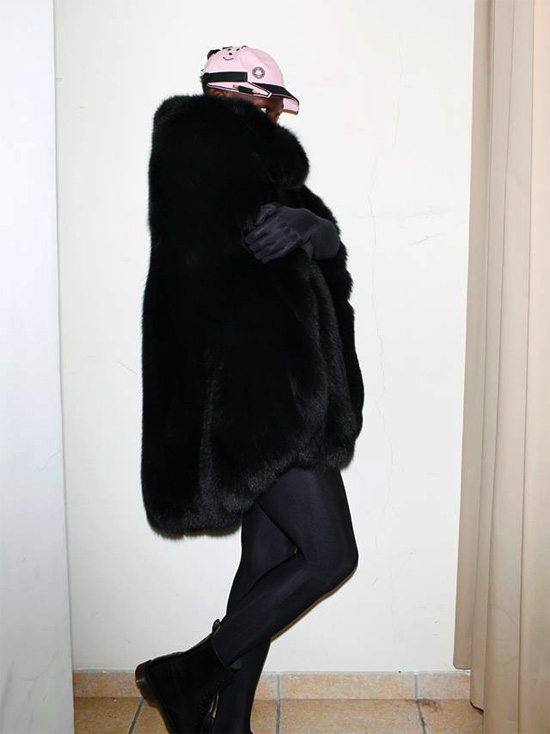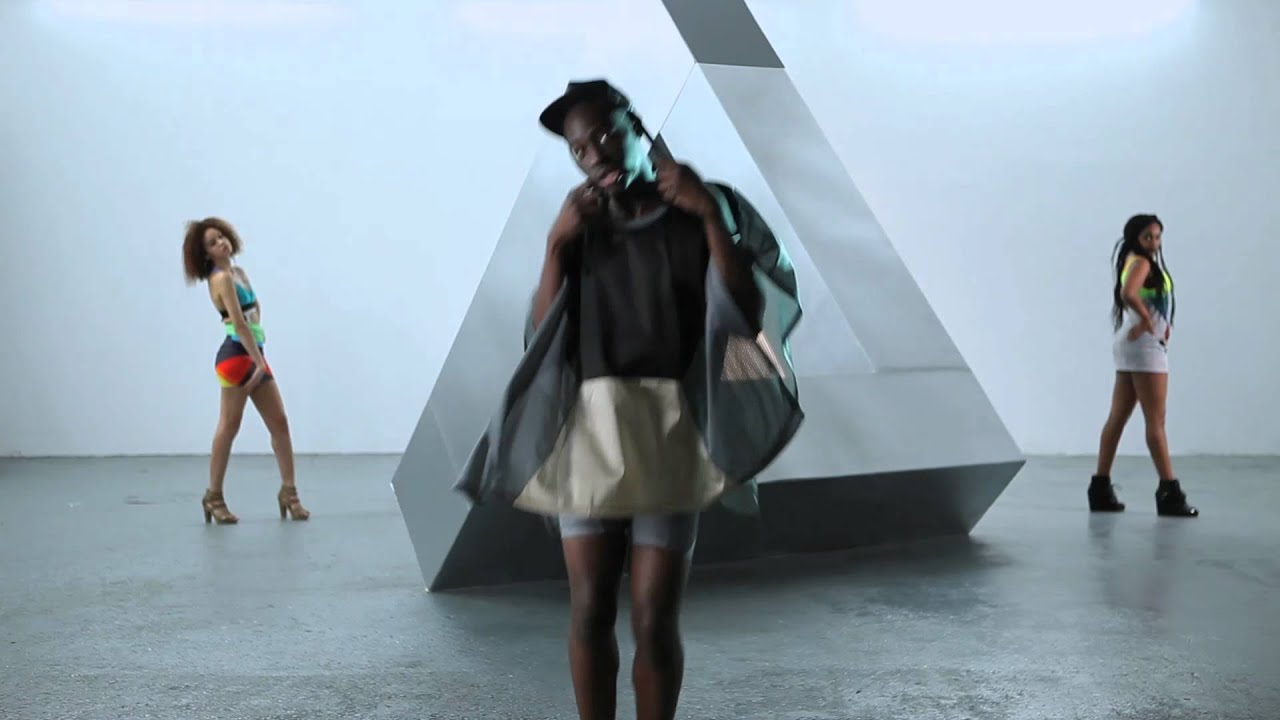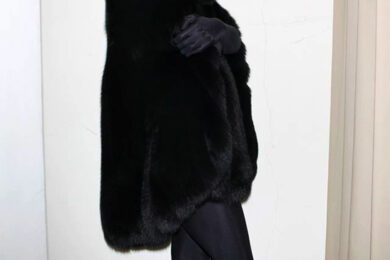New York rapper and producer Le1f (a glyphed-up shortening of Khalif Diouf) has got a hectic few months ahead of him. First, there’s the immanent arrival of Tree House, a mixtape of ‘love songs’ set to drop in early September, with its first track ‘Damn Son’ having emerged recently via Soundcloud – although judging from his libidinous output to date, expect bang for your buck rather than slushy ballads. At the same time, he’s working with Kansas-based producer Morri$ on the next record from Spank Rock and, to top it all off, there’s a debut album in the works – although when I catch up with Le1f after his summer show at Shoreditch’s Concrete, any probing on that topic is met with nothing more than a mischievous giggle and a tight-lipped headshake.
He’s no stranger to this prolific work rate. The beginning of this year saw the release of Fly Zone, the hotly anticipated follow-up to his debut mixtape Dark York, itself released barely nine months earlier. The latter’s heady hybrid beats – laid down by the likes of Nguzunguzu and Boody – and Le1f’s tempo-hopping cadence triggered off ripples of interest around the hip hop community. But it was the video for ‘Wut’ – not to mention the hype around so-called ‘queer rap’ just as it hit – that really quickened people’s pulses. A "black belt in twerk-wondo", Le1f flexed his way through the video, grinding out moves inspired equally by the New York vogue scene and Japanese animated series Dragon Ball Z. If that alone didn’t catch your attention, then the oiled-up, Pikachu-masked jock, on whose knee Le1f perches to spit the track’s double-time verses, certainly should have.
Much like many of Le1f’s beats, the video took its inspiration from the UK’s grime scene, using pure white space as a backdrop to foreground his posturing (think Dizzee’s ‘I Luv U’). It was shot and kitted out with its Escher-like triangle stage prop by two of Le1f’s friends, director Sam Jones and set designer Matt Larkin, who the rapper met while studying dance and music at Wesleyan University. It was during this period that Le1f started experimenting with recording his own vocals, acquiring tips on technique from his equally talented classmates and a growing crew of artists that he’d met on New York’s underground party scene.
Whereas Dark York was a collection of the best of Le1f’s experiments, April’s Fly Zone was a much more concise onslaught, which also saw Le1f step back from producing to focus on writing. It was inhabited by "banjee, masculine, aggressive, club tracks", born both out of frustration while trying to write a mix of love songs and as a reaction to the sudden fuss about his sexuality. In ‘Airbending’ he twists an Eminem lyric to spit "I am whatever you say I am / stop worrying about how gay I am" with measured vitriol.
The mixtape as a whole, however, is anything but humourless. It’s a masterclass in lyrical acrobatics and sassy eye-rolls, as well as some more niche enclaves of Japanese gaming culture. The Quietus caught up with the self-professed "alien from the NYC" to talk dance, grime and Pokemon.
What have you been up to since Fly Zone dropped?
Khalif Diouf: I immediately got back to work, finishing a mixtape that I actually started before Fly Zone called Tree House. Fly Zone was actually a by-product of this tape – it was supposed to be entirely love songs but it’s been really hard to write because I don’t want to be cheesy or corny. I’ve also been touring a lot. I did lots of college shows in the States and I’ve had shows in Australia and Japan, which was amazing.
There are a lot of Japanese reference points in your music. There’s the obvious Pokemon thing, and I read that you’re into Butoh dance…
KD: I went to a cool prep school before high school in the States that had a dance department with really progressive ideas of how to make their own choreography – many of the professors were at the Boston Conservatory. One year included Butoh lessons. That whole experience of practising dance in a way more physical manner and really getting to the root of what’s going on with your body, the task of it, it hit a chord with me.
It was quite a political movement too, in terms of being created to radically step outside Western modes of dancing.
KD: Yeah, it really inspired me as a kid. But I started ballet when I was four, dance was always there. I used to dress up and put on clothes for my family all the time. My mum and my grandma are both singers – Carnegie Hall performers – and my grandfather actually did construction on the Lincoln Centre, that’s why my family moved to New York. I took dance again later at Wesleyan [University] but largely because I didn’t do well at the music major [laughs]. I really wanted to be mainly a music major, but it was just so mathematical, the way they taught composition. I would pass the first level and then never get through the second one. I took some classes three or four times! With dance I came into it with so much experience that I knew that I’d be able to do my own work. Every single homework assignment, I mean, I could hand it in, but it was really going on the blog.
Wesleyan has a lot of notable alumni from that period – Santigold, MGMT and Das Racist for example.
KD: I knew quite a lot of people there, by chance, from the summer before I arrived. That’s when I met the Das Racist guys and a bunch of my Wesleyan friends and Santi. But also Blue Man Group were there!
How did you then move into the New York hip hop scene?
KD: I’m from New York, but when I was at boarding school I would come home and not really know people. I didn’t have much of a base in New York, so I just found the events that I wanted to go to and met people there. I was a 16-year-old in a 21-year-old space. People like Black Cracker, Bunny Rabbit, Light Asylum’s Shannon [Funchess], who was like a second mom – they mentored me both as friends and artists. I watched how they worked and they taught me how to record my own vocals.
Does movement still influence your beat-making and the way you put tracks down?
KD: If I’m producing then yes, it’ll affect the arrangement entirely. The EP with Boody [Liquid] felt very much like that. The way he lays downs his drums is just by feeling it out. He sees what happens and trusts the piece to come together. Working in that way, we found a similar style – laying out the percussion is very physical.
I was intrigued when I saw Spank Rock had produced and rapped on a track on Fly Zone. For me, he occupies an interesting space, making hip-hop for more of a club environment – something I see in your music as well. Was he a big inspiration?
KD: That was one of those albums that pulled me into becoming a rapper. The second Dizzee Rascal album, the first MIA album and YoYoYoYoYo – that was what I was listening to when I really tried to start this. We’ve been friends for a while now, I met Naeem [Spank Rock] in 2008. He was a friend of Dante’s Fried Chicken – it was one of those parties that broke a lot of awesome emerging artists, from cities on the east coast mainly. The first time Santi played Santigold was in that space. Dante was also a cook. You’d play like $15-20 bucks and get and awesome plate of food and a cool show. That’s when I met Spank Rock.
And you had wanted to work with him since then?
KD: Yeah, I mean the reason that he knew who I was because they had put up all their a cappellas on OpenVerse so people could use them for remixes or as samples… and I basically remixed the entire album, yeah, I made a remix of every single song!
Has he heard them?
KD: No [laughs]. It’s online, but I’m not telling anyone how to find it!
What about the other producers on Fly Zone? Were they friends or some new faces that you hadn’t met before?
KD: The only person I hadn’t met was Drippin, and Souldrop I guess. I met LOLGurlz after I made the song. That happens sometimes, half of these relationships are just over Soundcloud, sending beats to each other. Morri$ is so awesome – I love him. There again, I met him after he made the songs on Dark York.
I saw you tweet, ‘I did Dark York to set me free and Fly Zone to make a point.’ Talk to me about what you meant by that.
KD: I’ve been making music informally and playing shows for five, six years. I was paying it forward, because I was still a teenager and I didn’t like the way my show sounded and there were so many things that I had to learn to do. So I was paying my dues for a while until I graduated from college. I came to the point of, ‘Am I going to get a job, or am I going to make this work now?’ I was kind of seeing how it worked.
I started accumulating the best of everything that I had made at that point and assembled that mixtape [Dark York] in that way. I literally had a list of topics I wanted to cover. I made decisions to leave out some political subjects. But as a result of me being totally honest about everything on that mixtape, and discussing everything I wanted to, it led to it still being political for some people anyway. I got all this press last year for doing gay shit. I hadn’t realised at that point that there would be this one image that would end up representing all of my music, especially as at that point, the ‘Wut’ video wasn’t the first video I’d shot, it was the third. I had made a video for ‘Mind Body’ that was way crazier! I was literally naked, holding a baby rottweiler, with these Mary J/Spice Girl blonde braids. I really didn’t think [the ‘Wut’ video] was going to be that out there. I was trying to make Tree House, this melodious, sexy album, and I was not feeling sexy in the winter. I was aggressive and ragey and flying to all of these cities and feeling really crazy, so I wrote Fly Zone, and I just wanted to make these aggressive songs, some heavy cloud rap songs and a couple dance tracks. Actually, I really like the banjee, masculine, aggressive club tracks.
You said that Dark York was a collection of all your best bits, did you find the process of Fly Zone a lot more focused?
KD: Yes, I made it in six weeks, in very few studio sessions. I could have done it in one week if I’d had planned it like that. The first day we went in to record, I put down vocals for twelve tracks in about five or six hours.
There’s not a lot of your own production in Fly Zone. Was it difficult to let that go?
KD: There’s a little bit of vocal production, but not much. No, I’m really enjoying it, probably because I’m enjoying writing so much right now.
I read that when you first started out you didn’t like your voice that much. Is that something that you’ve started to get over?
KD: Yeah, but for that there were a few fundamental things I had to learn. I was trying to sit in a room recording my voice into a shitty computer microphone and spent that time thinking I sounded bad! There was a lot I had to learn about production, about vocal engineering and yeah, how to use my voice – where to hit in my throat and the distance from the mic. I wasn’t really taking a class on it at that point, I was just accumulating bits of information from friends.
Is that growing confidence why your vocals are a lot higher up in the mix in Fly Zone?
KD: I intentionally bought this $60 USB mic when I was making Dark York, so most the songs have this gritty sound from a cheap podcast mic, whereas Fly Zone was recorded in a proper studio. I mean, we tested three mics before we even recorded anything.
Is production something you want to start doing again?
KD: I’m definitely trying to stay in that headspace. Lately I haven’t really been making any beats but Morri$ and I are working on Spank Rock’s next record. I’ve made a couple of cool things but I’ve been being really picky. I don’t want to make trap and everyone wants to do trap right now, I need to make a new rig for myself quite soon!
Your videos are really aesthetically interesting. How much involvement do you have in them?
KD: The first two are by Sam Jones and the ‘Spa Day’ video is by my friend Jessie. They’re both my close friends, so we can make jokes about concepts and then they’ll turn into actual video.
Where did the Pikachu mask come from?
KD: Oh, that? I literally had the craziest dream one night. I was at this banquet with all these white bachelors and the A$AP crew were there, and I saw an image like that scene from ‘Yonkers’ with Tyler and the chair. It wasn’t Tyler but someone like that, and sitting on his lap was someone wearing a halloween frog mask. So originally I wanted a Squirtle or a Balthazar mask, but the only one that comes in glossy plastic is Pikachu. I’m so into water types! I was very seapunk at the time.
You mentioned A$AP there, and it seems like the New York hip hop scene is really vibrant at the moment in terms of the amount of stuff that’s coming out, but also the breadth. Why is it such fertile city right now?
KD: I think it’s a really good time in general for music, because the internet is amazing. Basically it’s a metropolis with millions of people. I feel like anything based on classic hip hop at the moment is pretty much in New York, whereas all the pop stuff is in LA, and if you’re trying to make grime or weird experimental you need to be in London, especially for rappers. I feel like there was a low where the scene become so much about DJs and production in New York for years. It felt like with me and Mykki [Blanco] and House of Ladosha, we were the only people even trying to rap in this community at one point.
You mentioned Dizzee earlier and there’s the Wiley sample in ‘Airbending’. There’s quite a lot of similarities between your music and grime not only in terms of production but references too – gaming’s a big one I guess. How did you get into that UK scene?
KD: Yeah, it was really a life-changing thing for me. I used to stream BBC 1Xtra online. It was [Dizzee Rascal’s] Showtime! It was the first time I found out what a record label really was. I mean I’d heard of Universal and Sony because you’d see them on the back of an Aaliyah album, but when I really clocked it, and thought about what a label did, was when I found what XL was because of Dizzee Rascal. When I found the XL website I thought wow, this is it.
You have your own label now.
KD: It’s a crew really, it’s called Camp&Street. My friend DonChristian, we just finished his label – it’s so good. I’m so excited.
You’ve spoken a lot about the fetishisation of gay rappers. Have people stopped "worrying about how gay" you are yet?
KD: Yeah, actually. The gigs have been really mixed, they’re just fun parties now. And mainly straight crowds, mostly cool girls, and some straight and gay dudes too.
You said you left a lot of political material out of Fly Zone. Is that going to have a home elsewhere?
KD: In a very choice way, yes. In the same way it’s taken me a long time to be specific about this romance and shit, I’m still not even sure if I’m comfortable with it. I want to very specific and very honest, and I don’t want to speak for anyone that I’m not speaking for, or be preachy. Politics is a hard thing to write about; it’s hard to make a song timeless.
Le1f’s Dark York and Fly Zone mixtapes are out now. Tree House will be released on September 10th. For more on Le1f and to listen/download his music, click here to visit his Soundcloud




